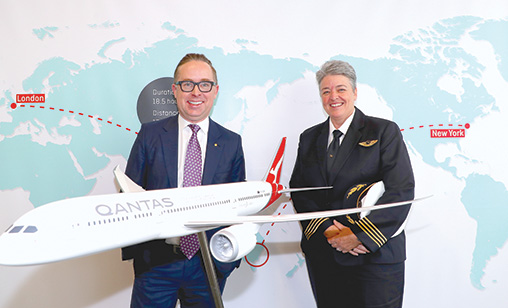News Backgrounder
December deadline for Project Sunrise pay deal “very ambitious”
Reaching a cockpit crew pay deal for non-stop Sydney and Melbourne flights to London and New York by year-end is not a given, Australia’s pilot organisation warns.
September 1st 2019
At press time, formal enterprise bargaining agreement (EBA) talks between Qantas and its pilots about pay and conditions for crewing Project Sunrise flights had just begun with the pilots awaiting an offer from the airline group. Read More »
Qantas Group CEO, Alan Joyce, has repeated often in the last six months that the business case for the ultra-long non-stop flights between Sydney and New York and London, must stack up and that getting the right pay deal from its pilots was essential to approval of Project Sunrise flights by year end.
 |
At the turn of the month, Australian and International Pilots Association president, Mark Sedgwick, told Australian media the Qantas deadline would not influence the bargaining position of its members. “Sunrise is a decision for Qantas management to make. The timeline [of less than four months] at this point is very ambitious,” he said.
Last month, the airline announced it would operate ultra-long haul research flights before the end of the year aboard 787-9s. The aircraft will collect data about inflight passenger and crew health and wellbeing, the airline said.
The October, November and December flights will be scheduled aircraft deliveries from Boeing, but instead of flying empty from Seattle to Australia, they will follow two Project Sunrise routes, from London and New York to Sydney, carrying about 40 passengers.
The journeys will be the world’s first direct flights by a commercial airline from New York to Sydney and will mark the second time a commercial airline has flown directly from London to Sydney.
The Project Sunrise test flights were announced at the same time the airline group revealed its annual results, to June 30. It reported an underlying profit before tax of US$880 million for the 12 months, down by 17% from the previous year.
Domestic, international and the group loyalty program made money. LCC Jetstar delivered mixed results. Jetstar Japan brought in a record profit and Vietnam’s Jetstar Pacific was profitable. Jetstar performed poorly and as did its regional flights in New Zealand.
Participants in Project Sunrise inflight research will be drawn mainly from Qantas’s workforce with work designed by Sydney University’s Charles Perkins Centre and Monash University.
Alertness, safety and productivity will be monitored by wearable technology devices at specific times during the 19-hour journeys. Scientists and medical experts from the Charles Perkins Centre will monitor sleep patterns, food and beverage consumption, lighting, physical movement and inflight entertainment to assess the impact on health, wellbeing and body clock of people flying for such long periods of time.
Melbourne’s Monash University team will work with pilots to record crew melatonin levels before, during and after the flights. Pilots will wear an EEG (electroencephalogram) device that tracks brain wave patterns and monitors alertness. The aim is to establish data to assist in building the optimum work and rest patterns for pilots operating long-haul services.
Joyce said the flights will give medical experts the chance to do real-time research that will translate into health and well-being benefits. “Ultra-long haul flying raises several commonsense questions about the comfort and well-being of passengers and crew. These flights are going to provide invaluable data to help answer them,” he said.
For customers, minimizing jet lag and creating an environment where they can experience a restful, enjoyable flight will be critical to the success of the routes. For crew, it will be about applying scientific research to determine the best opportunities to promote alertness when they are on duty and maximize rest during their downtime on the flights.
Airbus has pitched its A350-1000 for the proposed routes and Boeing the 777-8X. Go-ahead, apart from a new EBA with pilots, will depend on aircraft economics and regulatory approvals, Joyce said.